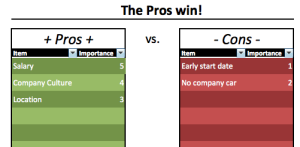 College campuses create an army of students who need to plan ahead. Some ambitious students schedule their future with seven-year plans for grad or professional school, or at least four-year plans.
College campuses create an army of students who need to plan ahead. Some ambitious students schedule their future with seven-year plans for grad or professional school, or at least four-year plans.
This creates the college mindset that failing to have a plan is failing to meet expectations, and no one wants that. So, students craze over the idea of knowing what they’re doing—in at least the short-term, and many times the long-term.
One specific, short-term area where college students desire a plan is for their summer. They ask questions like: Where will they be? And, where will they work?
When it comes to finding summer work, if a college student can’t get a paid internship, many students debate over taking the unpaid internship or the paid summer job.
Unpaid Internship
The number one argument from students who take unpaid internships is that it will help them get a job in the future. But, statistics say otherwise.
According to the National Association of Colleges and Employers (NACE), unpaid internships are not that helpful, if at all, for getting students a job after graduation. In the Class of 2013 Student Survey, NACE found that 37% of unpaid interns and 35% of people without an internship get one job offer or more.
This is pretty shocking! Amid all the talk that you need to put your time in as an unpaid intern and then you will be rewarded, this data directly confronts that mindset.
(However, 63% of paid interns received at least one job offer after graduation, which shows the significant advantage of a paid internship.)
There may be lurking variables that can explain why this data isn’t so straightforward. But, the point—that unpaid internships don’t statistically help applicants in the job search process—needs to be taken into strong consideration the next time you are offered an unpaid internship.
Yet, at the same time, an unpaid internship can be an extremely valuable experience.
If you haven’t figured out what you want to do yet, it’s a good idea to get a feel for that type of work before signing a full-time contract. By interning, you can learn if you enjoy this job and want to pursue a full-time position, or you can save yourself years of painful work if you don’t enjoy it.
I believe that there is a greater chance of being hired by a company you intern for, whether that is paid or unpaid. Companies are all about minimizing risk, and if you contribute well as an intern, then you’re more likely to get a full-time offer near graduation compared to a candidate that they don’t know.
So, being an unpaid intern can get you access that you otherwise wouldn’t have before applying for a full-time position with the same company. Work hard, and then share your in-depth production when you come back to interview.
Lastly, an unpaid internship is more likely to foster connections that can help your career prosper than a summer job. Summer jobs have their advantages, but many times you’re working with adults who aren’t in positions to network for you in the industry that you want. (This is at least true from my experience as a baseball umpire on the weekends, when I was home from college.)
Paid Summer Job
While a summer job probably won’t make your friends say, “Wow! That’s amazing!,” when you tell them about it, don’t undervalue the benefits and learning experiences that usually come along with these type of gigs.
Another interesting finding in NACE’s survey, is that students without an internship made more money starting out—$37,087—compared to students with unpaid internship experience—who made $35,721.
Again, this shouldn’t be taken as cause and effect, because there are many unaccounted variables. But, it’s helpful to know that taking a summer job over an unpaid internship doesn’t seem to hurt your job prospects or starting salary.
By summer job, I mean something that is usually outside a corporate office and dealing with people in some type of service. Common examples of summer jobs include: lifeguard, waiter, freelance writer, camp counselor, and babysitter.
Summer jobs offer many learning experiences that can be harder to find as an intern. Because most of these positions are service jobs, they inherently involve working with other people.
You’re going to learn communication skills in any of the example summer jobs listed above.
For example, trying to persuade Bob away from the small appetizer dish to the expensive dish will require careful observation, listening, negotiation, and energy.
Ironically, communication skills are crucial in getting and performing at almost every full-time position. Besides improving your skills at a summer job, getting paid will be a reward in itself.
My Viewpoint
Context needs to be at the front of this discussion, because (in my opinion) it’s not a clear choice between taking the unpaid internship or summer job. In this post, I simply wanted to level the playing field and analyze the assumption that you have to intern during your college summers or you will pay for it later. I don’t think that’s 100% true.
For those who are going to take an unpaid internship, I will say to be careful and do all your research beforehand. It’s also important to directly ask the company if they’ve had interns before, and what the working day looks like.
If they’ve had interns before, then there’s a better chance that they will know how to manage and give out reasonable responsibility. It’s probably a red flag if the company says, “You’ll be our first intern ever.”
Final Words
First and foremost, try to get a paid internship for the immediate paycheck and greater chance of landing job offers in the future. If you can’t get a paid internship, then you need to evaluate your situation when deciding on an unpaid internship or summer job.
Look at what you want your future to be and then use this framework to try to determine if an unpaid internship or summer job will play a factor. For example, if you need money to travel after school, then a summer job is a better fit. If you don’t know what you want to do after school, getting professional experience to narrow your options as an unpaid intern might be the better option.
Also, you can find a paid internship during the school year or winter break, so don’t stress about not having a paid internship for the summer.
If you’re frustrated about all the interviews you’ve done without an offer, don’t be. Practicing interviewing is one of the best investments of your time, because that’s an invaluable skill to have when looking for full-time positions.


